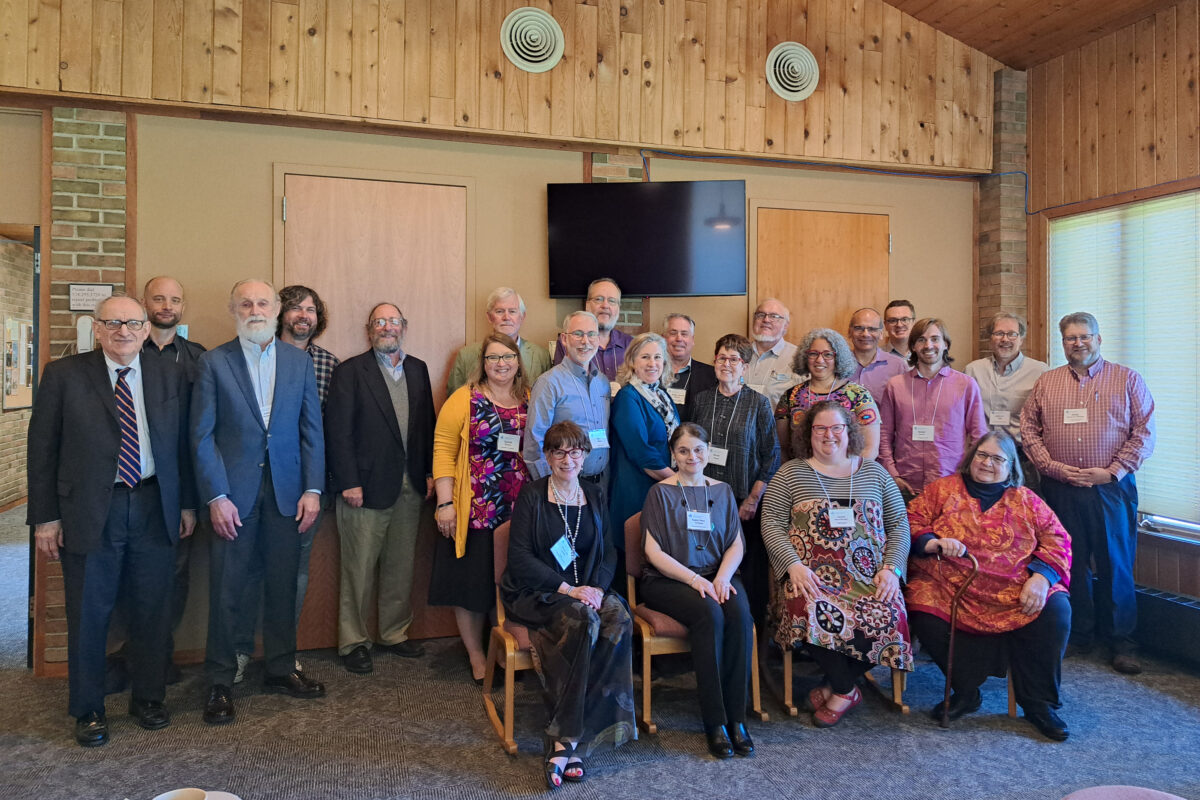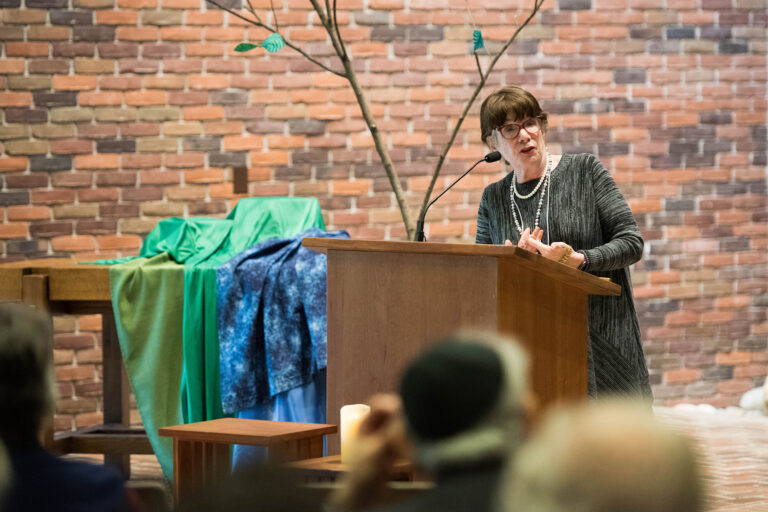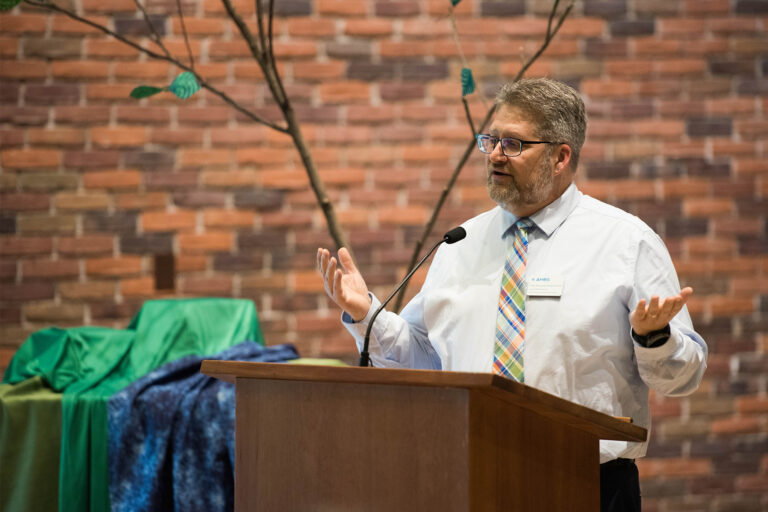by David. C. Cramer, Institute of Mennonite Studies. Originally published by Anabaptist Mennonite Biblical Seminary
ELKHART, Indiana (Anabaptist Mennonite Biblical Seminary) — Jewish and Mennonite leaders and scholars gathered May 8–10 in Elkhart, Indiana, for in-depth conversations on Scripture, faith and theology at a symposium hosted by Anabaptist Mennonite Biblical Seminary (AMBS).

Titled “Jews and Mennonites: Reading the Bible after the Holocaust,” the event brought together eight rabbis and Jewish scholars and 14 Mennonite pastors and scholars seeking to grow in mutual understanding, build relationships and counter antisemitism together.
“This symposium broke new ground in Mennonite-Jewish dialogue with compelling content, relationship building and frank discussions,” said Rabbi Noam Marans, the American Jewish Committee’s Director of Interreligious and Intergroup Relations. “Even as we learned more about one another, there was no avoidance of the most challenging issues.”
The event was the second in a series of planned gatherings following the adoption of the resolution Seeking Peace in Israel and Palestine by the Mennonite Church USA (MC USA) Delegate Assembly in July 2017 in Orlando, Florida. One of the commitments named in the resolution is to “seek deeper relationships with Jewish communities and actively oppose antisemitism.”
A first conference, “Mennonites and the Holocaust,” was held March 16–17, 2018, at Bethel College in North Newton, Kansas, and resulted in the 2021 publication of the volume European Mennonites and the Holocaust by the University of Toronto Press in association with the United States Holocaust Memorial Museum. Discussions are underway about potential future gatherings.
Jackie Wyse-Rhodes, PhD, Associate Professor of Hebrew Bible at AMBS, appreciated being able to strategize with rabbis and Jewish scholars at the symposium about ways to avoid anti-Jewish readings of Scripture.
“I have no doubt that this remarkable symposium will serve as a touchstone for AMBS going forward as we pursue and prioritize interreligious dialogue,” she reflected. “What we learned in our three days together is already helping us develop additional strategies for training our students to call out and condemn latent and overt antisemitism in some streams of Christian biblical interpretation and in our communities.”
Rabbi David Sandmel, PhD, Chair of the International Jewish Committee for Interreligious Consultations, expressed hope that Mennonites would continue the work that took place at the symposium.
“It is heartening that some in the Mennonite Church are seriously addressing these important and difficult matters, and especially that they have chosen to do so in a dialogic process with representatives of the Jewish community,” he said. “The biggest challenge is ensuring that the fruits of these discussions are disseminated and come to inform the daily life of the entire Mennonite community.”
Building understanding through dialogue

Amy-Jill Levine, PhD, opened the symposium with a public plenary address in AMBS’s Chapel of the Sermon on the Mount, titled “Misunderstanding Judaism Means Misunderstanding Jesus and Paul.” Levine is Rabbi Stanley M. Kessler Distinguished Professor of New Testament and Jewish Studies at Hartford (Connecticut) International University for Religion and Peace and Professor Emerita at Vanderbilt University in Nashville, Tennessee.
In her address, Levine presented reasons why church sermons and teachings continue to perpetuate antisemitic impressions and discussed common mistakes Christian preachers and teachers can make out of a lack of understanding of the Jewish contexts of Jesus and Paul. She encouraged Mennonites to profess a “high Christology” where Jesus’ uniqueness is expressed for Christians in terms of his divine identity more than in terms of his ethical teachings, which can be found throughout various Jewish sources as well. She told the Christians in attendance that they “need not make Judaism look bad in order to make Jesus look good.”
Later that day, John Kampen, PhD, Distinguished Research Professor at Methodist Theological School in (Delaware) Ohio, presented a lecture to symposium participants titled “Neighbors, Strangers and Tragic Consequences: Background to Jewish-Mennonite Dialogue.” In addition to tracing the relationship between Jews and Mennonites from the 16th century to the present, Kampen referenced a meeting held in the fall of 1980 at AMBS, “The Shalom Consultation of Jewish and Christian Pacifists.” He recalled giving the opening address, titled “Preface to Dialogue.”
“This symposium on the AMBS campus now 43 years later means that I no longer have to give that address. The dialogue has begun,” he stated.
The remainder of the symposium addressed major topics for dialogue between Jews and Mennonites and provided multiple opportunities for small-group conversations. Sarah Tanzer, PhD, Professor of New Testament and Early Judaism at McCormick Theological Seminary in Chicago, and Ted Hiebert, PhD, Francis A. McGaw Professor of Old Testament Emeritus at McCormick, led a discussion on the Law versus grace/faith based on a course they have co-taught, “Biblical Foundations of Jewish and Christian Difference.” They invited participants to read passages from Galatians 2 and 3, Deuteronomy 6 and 30, and rabbinic literature from the fourth and fifth centuries CE and to consider how and why Paul polarized the Law and faith (noting that he was writing to Gentile Christ-believers, not to or about Jews). They also discussed the roles that Torah, or the Law, played for the writers of Deuteronomy and the rabbinic interpreters.
Kampen and Sandmel led a session on universalism and particularism. Participants read a variety of texts of significance to Jews and Mennonites and discussed their commonalities and differences. They explored how — contrary to the Enlightenment stereotype of Judaism as “particular” and Christianity as “universal” — both traditions have forms of particularism in service of universal blessings on humankind and all creation.
John D. Roth, PhD, Project Director of MennoMedia’s “Anabaptism at 500” initiative that is producing the Anabaptist Community Bible, appreciated the opportunity to study Scripture with rabbis and Jewish scholars.
“The symposium was deeply illuminating and educational for me,” he stated. “The gathering was both an opportunity to learn to know rabbis and Jewish scholars on a personal level and also to be reminded again of the Jewish context of the New Testament and the various ways that Christian interpretations of the New Testament can easily slip into antisemitism.”
Barbie Fischer, MA, Executive Director of Restorative Encounters in the Philadelphia area, moderated a panel on Jewish and Mennonite expectations for the future of religion in North America and beyond. Panelists included Rabbi Jamie Gibson, MHL, DD, Rabbi Emeritus of Temple Sinai in Pittsburgh and Rabbi Jason Edelstein Endowed Chair in Catholic Jewish Dialogue at Saint Vincent College in Latrobe, Pennsylvania; Rabbi Yehiel Poupko, Rabbinic Scholar at the Jewish United Fund/Jewish Federation of Metropolitan Chicago; Mary Schertz, PhD, Professor Emerita of New Testament at AMBS; and Drew Strait, PhD, Assistant Professor of New Testament and Christian Origins at AMBS.
Fischer, who participated in the symposium as a Jewish Mennonite, reflected, “As someone raised in the Anabaptist tradition with Jewish heritage who found a home in the Mennonite Church, this symposium was the first time I have ever felt there was true hope that I could be wholly accepted as a Jewish Mennonite. My biggest joy in being interfaith is the complexity and beauty my Jewish heritage brings to understanding Christianity and Christian Scripture.”
Another symposium participant, Matthew Thiessen, PhD, Associate Professor of Religious Studies at McMaster University in Hamilton, Ontario, noted, “I’ve devoted my academic life to more accurately and charitably portraying Judaism and seeking to place both Jesus and Paul within ancient Judaism, not against it. This symposium, though, is the first time I’ve been in an explicitly religious context where the goal was for Jews and Christians to have conversations that would lead to better understanding one another.”
The symposium concluded with a gathering for reflection and a discussion about future conversation topics for Jews and Mennonites moderated by Andy Brubacher Kaethler, PhD, Associate Professor of Christian Formation and Culture and Associate Director of the Institute of Mennonite Studies (IMS) at AMBS. Participants identified the need for further attention to such topics as messianic Judaism; Mennonite and Jewish understandings of Israel, Zionism and the land; what Mennonites and Jews can do to combat the resurgence of antisemitism in the United States and beyond; how Mennonites can reckon with their history of involvement in Nazism; and how to include more Black, Indigenous and other People of Color in conversations between Jews and Mennonites.

“The issues discussed in this symposium have direct implications for pastors and congregational life,” noted Joel Miller, MDiv, Pastor of Columbus (Ohio) Mennonite Church. “Understanding Jewish readings of Scripture, the significance of Israel for Jewish peoplehood, and ways Jews are engaging their local communities helps us be better Mennonites.”
Lisa Schirch, PhD, Richard G. Starmann Sr. Professor of the Practice of Peace Studies at the University of Notre Dame in South Bend, Indiana, said that her experiences at the symposium are informing a study guide she is writing with Kathy Kern of Community Peacemaker Teams to help Mennonites understand their own history of antisemitism and their unique role in the Holocaust.
Rabbi Max Weiss, Rabbi of Oak Park Temple B’nai Abraham Zion in Oak Park, Illinois, expressed his gratitude for the event.
“It was one of the most well run groups of its type that I have had the opportunity to be part of,” he said. “We had the opportunity to have meaningful conversations in groups and most importantly at shared meals that went beyond surface discussions, enabling us to engage across our differences and look for areas of shared experience.”
The symposium was organized by a planning committee composed of Brubacher Kaethler, Kampen, Fischer and Tanzer; AMBS MDiv student Isaiah Friesen served as event coordinator. IMS sponsored the event, with supporting funds from the Faith Formation Collaborative (formerly the Center for Faith Formation and Culture) at AMBS, MC USA and the Schowalter Foundation. Participation in the symposium was by invitation, and no recordings were made in order to allow for free discussion among participants.
Symposium participants
Jewish participants
- Rabbi Reni Dickman, Executive Director of the Chicago Board of Rabbis and Senior Jewish Educator at the Jewish United Fund
- Rabbi Jamie Gibson, MHL, DD, Rabbi Emeritus of Temple Sinai in Pittsburgh and Rabbi Jason Edelstein Endowed Chair in Catholic Jewish Dialogue at Saint Vincent College in Latrobe, Pennsylvania
- Amy-Jill Levine, PhD, Rabbi Stanley M. Kessler Distinguished Professor of New Testament and Jewish Studies at Hartford (Connecticut) International University for Religion and Peace and Professor Emerita at Vanderbilt University in Nashville, Tennessee
- Rabbi Noam Marans, the American Jewish Committee’s Director of Interreligious and Intergroup Relations, Teaneck, New Jersey
- Rabbi Yehiel Poupko, Rabbinic Scholar at the Jewish United Fund/Jewish Federation of Metropolitan Chicago
- Rabbi David Sandmel, PhD, Chair of the International Jewish Committee for Interreligious Consultations, Portland, Maine
- Sarah Tanzer, PhD, Professor of New Testament and Early Judaism at McCormick Theological Seminary in Chicago
- Rabbi Max Weiss, Rabbi of Oak Park Temple B’nai Abraham Zion in Oak Park, Illinois
Mennonite participants
- Malinda Elizabeth Berry, PhD, Associate Professor of Theology and Ethics and Director of the Faith Formation Collaborative at AMBS
- Barbie Fischer, MA, Executive Director of Restorative Encounters in the Philadelphia area
- Ted Hiebert, PhD, Francis A. McGaw Professor of Old Testament at McCormick Theological Seminary in Chicago
- Mark Jantzen, PhD, Professor of History at Bethel College in North Newton, Kansas
- Andy Brubacher Kaethler, PhD, Associate Professor of Christian Formation and Culture and Associate Director of the Institute of Mennonite Studies at AMBS
- John Kampen, PhD, Distinguished Research Professor at Methodist Theological School in (Delaware) Ohio
- Paul Keim, PhD, Student Services Coordinator and Core Adjunct Faculty member at AMBS and Professor of Bible, Religion and Philosophy at Goshen (Indiana) College
- Joel Miller, MDiv, Pastor of Columbus (Ohio) Mennonite Church
- John D. Roth, PhD, Project Director of MennoMedia’s “Anabaptism at 500” initiative, Goshen, Indiana
- Mary Schertz, PhD, Professor Emerita of New Testament at AMBS
- Lisa Schirch, PhD, Richard G. Starmann Sr. Professor of the Practice of Peace Studies at the University of Notre Dame in South Bend, Indiana
- Drew Strait, PhD, Assistant Professor of New Testament and Christian Origins at AMBS
- Matthew Thiessen, PhD, Associate Professor of Religious Studies at McMaster University in Hamilton, Ontario
- Jackie Wyse-Rhodes, PhD, Associate Professor of Hebrew Bible at AMBS
Located in Elkhart, Indiana, on ancestral land of the Potawatomi and Miami peoples, Anabaptist Mennonite Biblical Seminary is a learning community with an Anabaptist vision, offering theological education for learners both on campus and at a distance as well as a wide array of lifelong learning programs — all with the goal of educating followers of Jesus Christ to be leaders for God’s reconciling mission in the world. ambs.edu

